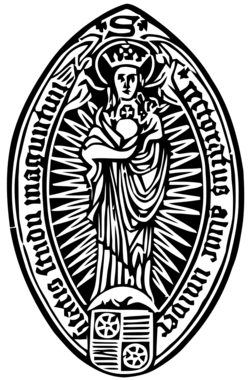Difference between revisions of "Johannes Gutenberg University Mainz"
(Created page with "{{group |wikipedia=https://en.wikipedia.org/wiki/Johannes_Gutenberg_University_Mainz |constitutes=university |leaders= |logo= |twitter= |start= |headquarters=Mainz, Germany }}...") |
(unstub) |
||
| Line 3: | Line 3: | ||
|constitutes=university | |constitutes=university | ||
|leaders= | |leaders= | ||
| − | |logo= | + | |logo=Rector's Seal of the University of Mainz.png |
|twitter= | |twitter= | ||
| − | |start= | + | |type=public,research |
| − | |headquarters=Mainz, Germany | + | |start=1477 |
| + | |headquarters=Mainz, Rhineland Palatinate,Germany | ||
| + | |description=One of the major research-intensive and leading medical universities in Germany. | ||
}} | }} | ||
| + | The '''Johannes Gutenberg University Mainz''' is a [[public university|public]] [[research university]] in [[Mainz]], [[Rhineland Palatinate]], Germany, named after the printer [[Johannes Gutenberg]] since 1946. With approximately 32,000 students (2018) in about 100 schools and clinics, it is among the largest universities in Germany. | ||
| + | |||
| + | The university is a member of the German U15, a coalition of fifteen major research-intensive and leading medical universities in Germany. The Johannes Gutenberg University is considered one of the most prestigious universities in Germany. | ||
| + | |||
| + | The university is part of the IT-Cluster Rhine-Main-Neckar. The Johannes Gutenberg University Mainz, the [[Goethe University Frankfurt]] and the [[Technische Universität Darmstadt]] together form the [[Rhine-Main-Universities]] (RMU). | ||
| + | |||
| + | According to the report of the [[Deutsche Forschungsgemeinschaft|German Research Foundation]] (DFG) from 2018, the University of Mainz is one of the best universities in [[natural science]]s in Germany. In the period under review from 2014 to 2016, the University of Mainz received the highest number of competitive grants in the [[natural science]]s. The university also achieved the first place in [[physics]].<ref>Deutsche Forschungsgemeinschaft, ed. (18 July 2018), "Förderatlas 2018", Forschungsberichte (in German) (1 ed.), Weinheim: Wiley-VCH, pp. 127 ff., </ref> | ||
| + | |||
| + | |||
{{SMWDocs}} | {{SMWDocs}} | ||
==References== | ==References== | ||
{{reflist}} | {{reflist}} | ||
| − | |||
Latest revision as of 11:27, 3 August 2021
(University) | |
|---|---|
 | |
| Formation | 1477 |
| Headquarters | Mainz, Rhineland Palatinate, Germany |
| Type | • public • research |
| One of the major research-intensive and leading medical universities in Germany. | |
The Johannes Gutenberg University Mainz is a public research university in Mainz, Rhineland Palatinate, Germany, named after the printer Johannes Gutenberg since 1946. With approximately 32,000 students (2018) in about 100 schools and clinics, it is among the largest universities in Germany.
The university is a member of the German U15, a coalition of fifteen major research-intensive and leading medical universities in Germany. The Johannes Gutenberg University is considered one of the most prestigious universities in Germany.
The university is part of the IT-Cluster Rhine-Main-Neckar. The Johannes Gutenberg University Mainz, the Goethe University Frankfurt and the Technische Universität Darmstadt together form the Rhine-Main-Universities (RMU).
According to the report of the German Research Foundation (DFG) from 2018, the University of Mainz is one of the best universities in natural sciences in Germany. In the period under review from 2014 to 2016, the University of Mainz received the highest number of competitive grants in the natural sciences. The university also achieved the first place in physics.[1]
Alumni on Wikispooks
| Person | Born | Nationality | Summary | Description |
|---|---|---|---|---|
| Sucharit Bhakdi | 1 November 1946 | Germany Thailand US | Virologist Science/Science dissident COVID-19/Dissident | One of the first and most important dissidents against Covid. |
| Ulf Böge | 22 January 1942 | Germany | Economist who headed the German anti-trust office for 8 years | |
| Udo van Kampen | Journalist | Journalist, Atlantik-Brücke member, visited the Brussels Forum 2007-2009 | ||
| Jörg Kukies | 21 February 1968 | Germany | Economist | Goldman-Sachs bankster who became State Secretary and guiding hand for German Chancellor Olaf Scholz. Attended the 2022 Bilderberg Conference. |
| Renate Köcher | 17 July 1952 | Germany | Researcher Academic | Opinion pollster with solid ties to the establishment. Admits to selectively not publishing poll results she did not like, to influence public opinion. |
| Christoph von Marschall | 8 October 1959 | Germany | Journalist | Tranatlantic German journalist |
| Beatrice Weder di Mauro | 3 August 1965 | Italy Switzerland | Academic | International Monetary Fund, World Bank, advisor to German Chancellors Gerhard Schroeder and Merkel. World Economic Forum. Etc. |
| Omid Nouripour | 18 June 1975 | Iran Germany | Politician | German Green politician involved in many transatlantic influence networks. |
| Horst Teltschik | 14 June 1940 | Germany | Spook Politician Businessperson | Tri-Bilderberger chair of the Munich Security Conference 1999-2008 |
| Klaus Töpfer | 29 July 1938 | Germany | Politician | Attended Bilderberg as German Minister for the Environment. Later United Nations Environment Programme, involved in behind-the-scenes negotiations of the 1997 Kyoto Protocol. Advisor on energy and sustainable development etc. |
References
- ↑ Deutsche Forschungsgemeinschaft, ed. (18 July 2018), "Förderatlas 2018", Forschungsberichte (in German) (1 ed.), Weinheim: Wiley-VCH, pp. 127 ff.,